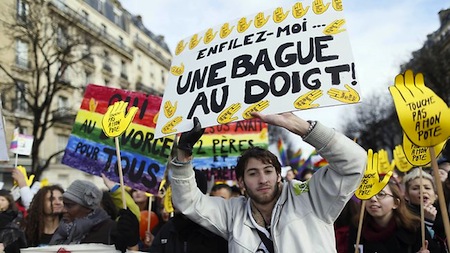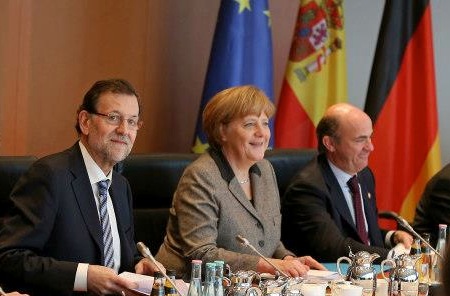Amid a flurry of parliamentary action in the United Kingdom and France, two of the largest countries in Europe and, indeed, two of the five permanent members of the United Nations Security Council, are set to legalize gay marriage in the coming months.![]()
![]()
The joint result gives an incredibly burst of global momentum for the idea of gay marriage and LGBT equality.
Even more striking, the gay marriage push has been pursued by two governments that couldn’t be much more different, ideologically — a right-wing, budget-cutting Conservative Party government in the United Kingdom and a leftist Parti socialiste (PS, Socialist Party) government in France.
Most immediately, in London yesterday, the British House of Commons voted overwhelmingly 400 to 175 to approve equal marriage rights for gay and lesbian partnerships in England and Wales. Enacting same-sax marriage rights has been at the heart of UK prime minister David Cameron’s ‘modernising’ mission for the Conservative Party — i.e., pulling it to the forefront of supporting socially liberal causes, while the government continues pursuing a very conservative economic agenda.
Nonetheless, Cameron’s efforts, historic as they may be, have not been without a cost — despite the overwhelming support of his coalition partners, the socially progressive Liberal Democratic Party and of the opposition Labour Party, only 127 of Cameron’s 303 Tory MPs supported Tuesday’s bill.
That’s frankly somewhat of an embarrassment for the prime minister, who’s facing increasing pressure from backbenchers who are worried about the government’s unpopularity nearly halfway through its five-year term — young Tory MP Adam Afriyie is already reported to be considering an upstart leadership campaign against Cameron. More worryingly than Afriyie, however, is the fact that Owen Paterson, the environmental secretary, led the Tory effort in the House of Commons against the gay marriage bill, and even Cameron’s attorney general, Dominic Grieve, abstained from the final vote.
For a party already perilously split on issues like the UK’s role in Europe, the vote has now opened a new rift over social progress as well, writes Polly Toynbee in The Guardian:
[Gay marriage], warn the old Tory chairmen of the shires, is “shaking the very foundations of the party”. If so, they really are done for. Cameron wrongly thought this a clause IV moment to parade a modernised party. Instead, he has revealed them as a nest of bigots. Disunity is electoral poison, and so is a leader losing control of his party. Rebel MPs, like runaway horses, lose their fear of whips. Gay marriage has become a proxy for other undisciplined craziness running through their veins, from hunting to Europe, privatising the NHS to breaking up the BBC, loathing windmills, loving fracking.
Notwithstanding the perils for Cameron, the bill will now proceed to the House of Lords, where it should pass relatively easily, and Cameron hopes to mark the law’s enactment later this summer. Scotland, meanwhile, is considering its own gay marriage bill later this year — first minister Alex Salmond’s majority government, dominated by the Scottish National Party, is set to advance the issue after consultation on the bill ends in March 2013.
But France will be racing to beat Great Britain to the marriage chapel.
Over the weekend, the Assemblée nationale (National Assembly) of France approved a change in the definition of marriage from an agreement between a man and a woman to simply an agreement between two people, paving the way for the adoption of a comprehensive same-sex marriage and adoption bill later this year.
Gay marriage has also proven divisive in France, where a strong Catholic opposition to gay marriage has polarized political views on the issue. Although France’s government won its most recent vote, it did so only with the support of the ruling Socialists — lawmakers from the conservative Union pour un mouvement populaire (UMP, Union for a Popular Movement) of former president Nicolas Sarkozy and the more far-right Front national (FN, National Front) of Marine Le Pen opposed the measure.
The conservative opposition has used amendment and other delaying tactics to stall the bill, despite a massive pro-LGBT rally in Paris late in January.
A recent poll shows that 63% of French voters support gay marriage. A Guardian poll in December 2012 showed nearly the same level of support (62%) among British voters.
Europe has long been at the vanguard of extending marriage rights to same-sex couples. Continue reading British, French governments poised to pass gay marriage into law


